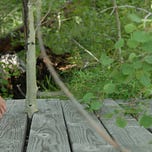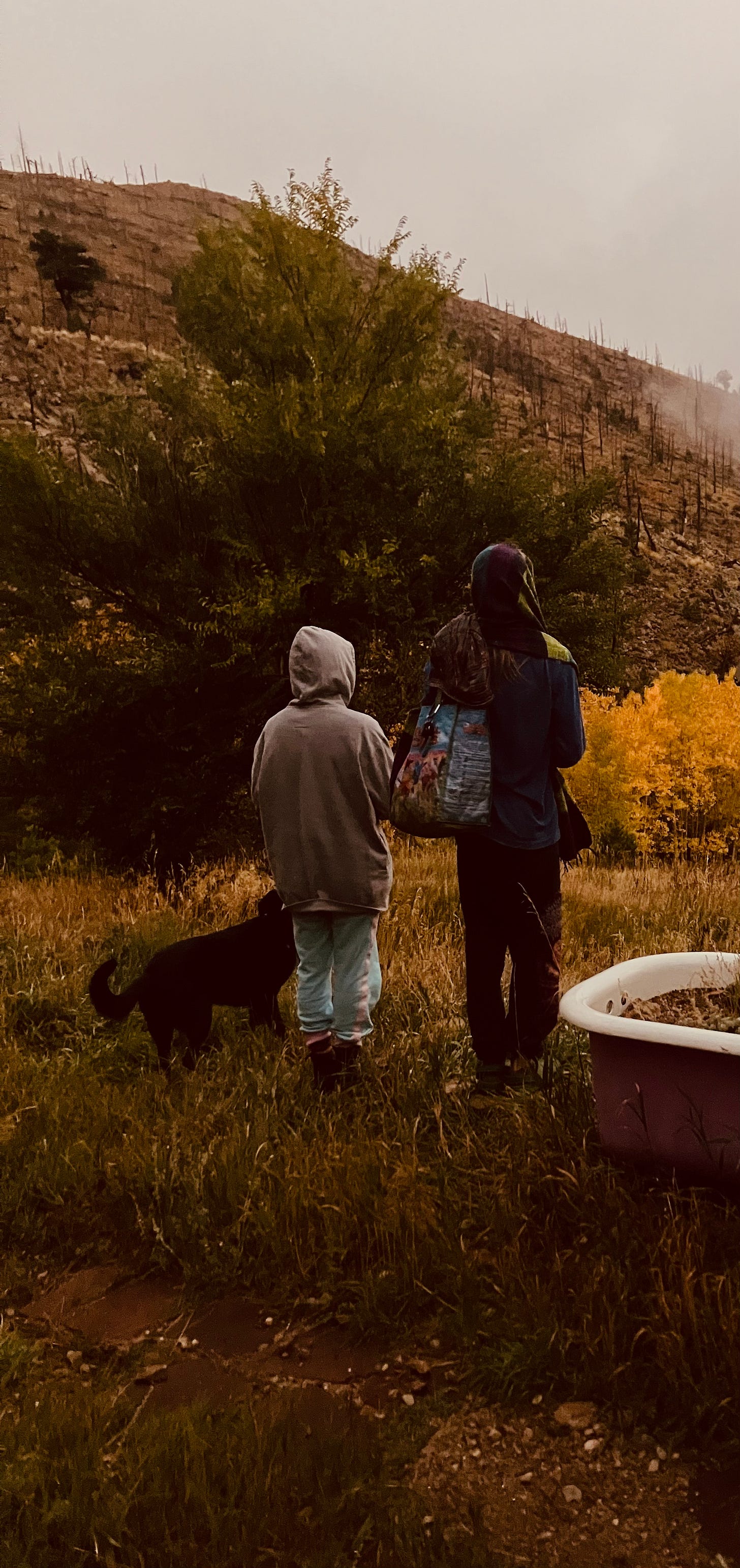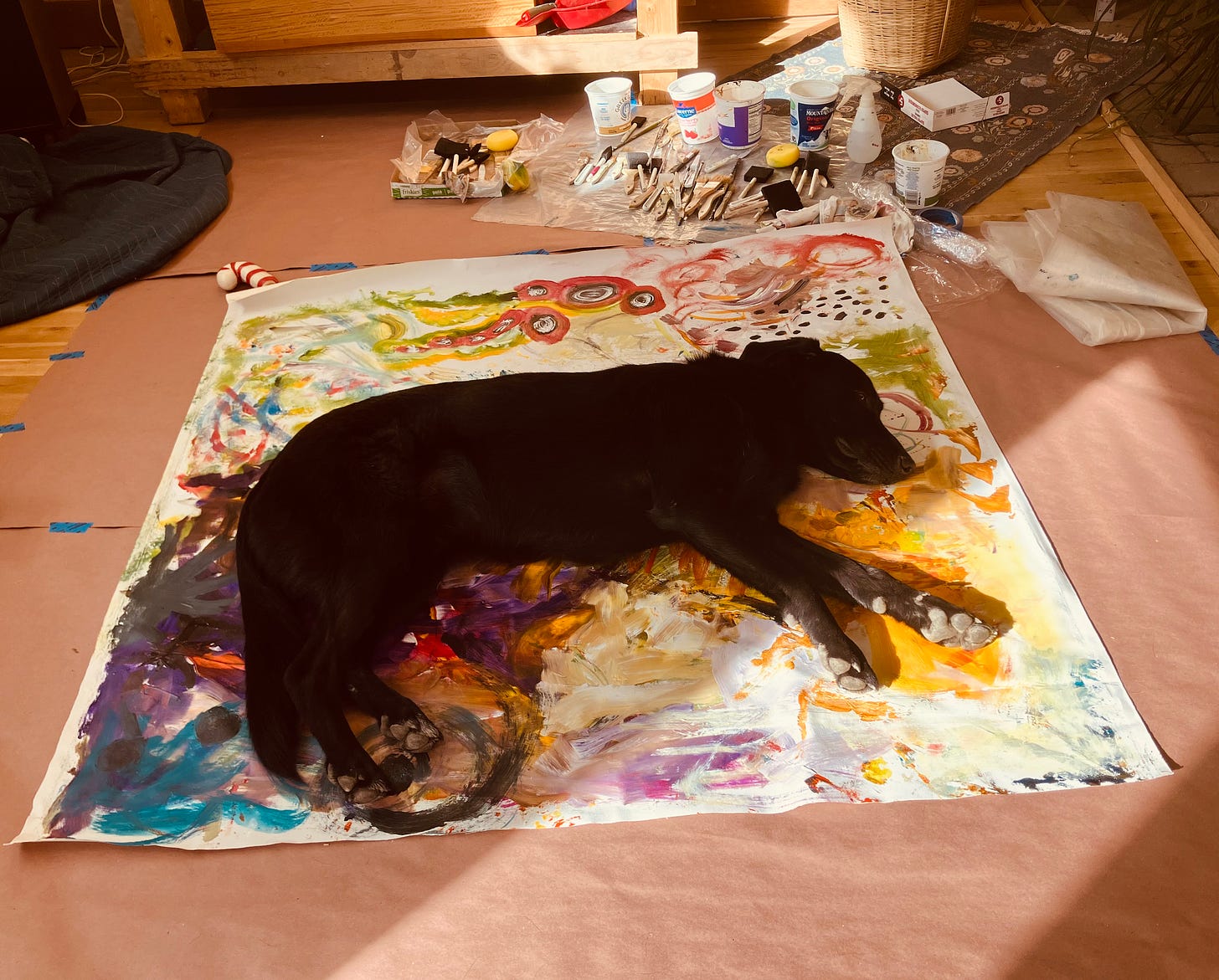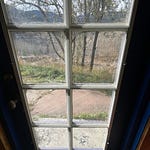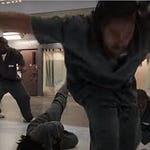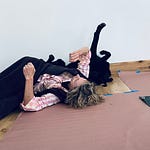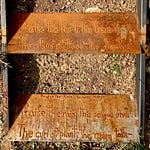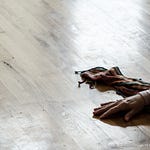I’m taking a writing class on Tuesdays nights with Arya Samuelson called The Anti-Outline Memoir Coven.
I signed up because, I mean, that title! And Arya’s writing —my body falls into the pages, swims and dives, when I read her words.
We talk about the before stories and the after stories in this class. The stories that issue forth from the backs of our bodies. Stories we cannot see with our eyes, but can feel with our spines.
The stories that are down in the basement, in the boxes, in the corner. The subterranean stories, that whisper and crawl. Stories that get down on their bellies and pull with their arms; push with their legs.
Stories that carve out the pathways at night, while the rest of us sleep. Pathways we will wake to and walk on; follow straight into the morning.
~
Glen was in the MRI machine getting his brain scanned while I was in the waiting room, reading.
There was not a lot of motion or activity in the waiting room that day, until all of a sudden there was, and we were being told to move and to move now. To stay calm and to follow the staff into the hallway.
I gathered my things — my jacket, my backpack — my thumb in my book to hold my place because I didn’t have time to turn the corner down, on the page.
We were led down the stairs, into the basement of the hospital, and there was Glen, in his hospital gown that tied in the back, and the bright yellow socks with the stickies on the bottoms of each foot, looking dazed and disoriented.
I took my thumb out of my book, lost my place in my reading, and went to him.
“What's happening?” He whispered.
“I don’t know,” I whispered back.
For a few minutes everyone in the basement shifted, from one foot to the other, doing without knowing they were doing it, what we in the dance world call, “The small dance.” A term and a time Steve Paxton came up with, focused on noticing the small shifts of a body standing. The breath and the weight; the release into gravity as the body stays upright.
So there we all were, doing the small dance, some of us in street clothes, some of us in hospital gowns, some of us in scrubs. The dance of standing close to still but not completely still, with those we did not know.
Then chairs were brought in for people who were struggling with standing, and one man, an old man, in a hospital gown and the same yellow socks Glen was wearing, started searching for his daughter.
“Maureen?” He said, looking around. “Maureen?”
His call for her became more urgent and more stressed: “Maureen?” He shouted, trying to push through the people and get to his daughter, who was not in the room with us that day.
She must have gone to another floor of the hospital, maybe to find the vending machine. Maybe to move her body a bit, walk up and down the stairs, while she waited for her father.
One of the nurses went to him, tried to calm him, but he was having none of it.
“Maureen!” He shouted again, fury in his face. “What did you do with my daughter?”
A staff member hurried over, “We’re getting her sir, right now. Give us a minute or two. We’ll find her.” This settled and calmed him, and the staff member was able to get him seated in a chair. We all knew that no one was going to find Maureen — would not even try — because the doors had been locked and no one was leaving.
By then Glen and I were on the linoleum floor, sitting side by side. Glen had his head in his hands and was saying, “My head. Jo, my head.” I held his hand and tried to soothe him but it wasn’t working, so I whispered, “Hang on honey, let me see what I can do.”
I was hesitant to ask for anything because we were in a precarious situation and the need in the basement that day was huge and people were afraid, but his head, Glen’s head. His head was hurting and it was getting bad.
I found a nurse in the split second when she wasn’t doing anything else, and whispered to her: “Glen Kalen. His head, it’s hurting, and he has a glioblastoma. I need to get him something for the pain before it gets worse.”
What the doctors told me when Glen was sick, is that the untreated pain of a glioblastoma is like nothing else. It is the kind of headache that sends you screaming to the emergency room, and I could feel Glen’s pain moving us in that direction.
She looked over at Glen and saw it too, so she quickly looked at his chart. Scanned up and down and then got him the medicine he needed to take away the pain. Then she gave me a quick and heart felt hug, and scurried to the next place she was needed.
I sat back down and Glen reached for my hand. I took it and held on.
The young woman sitting on the floor next to us was crying. Her mascara was running — two blurred black lines, painted down her face. She was also in a hospital gown, and I looked around to see who was with her — who had come with her to the hospital that day, to wait while she was in the MRI machine, but I didn’t see anyone.
A nurse came up to her, crouched down beside her, put her hand on the young woman’s knee to see if she needed anything, and that is when the young woman screamed.
“Get away from me! Leave me alone!”
Glen flinched and held my hand tighter.
“It’s gonna to be okay,” the nurse said to her, in a quiet voice, trying to soothe.
“You don’t know that,” the young woman said, still crying. “How can you know that?”
And what she said was true: nobody knew if all of us in the basement that day would be okay.
I texted my friends, Jenny and Sarie: “I’m at the hospital with Glen. He was in the MRI machine when they pulled him out. There’s an active shooter outside and they’ve gathered us all in the basement. They’ve locked us in, in case the shooter gets inside.”
Before I could respond to the flurry of texts that came from both Jenny and Sarie, it ended. The whole thing ended.
The doors to the basement were unlocked and we were herded out. They got the old man who’d been calling for his daughter out first, and Maureen was right there, waiting at the bottom of the stairs for her dad. All of us who had been doing a small sort of dance together for the hour or so that we were locked in that basement, witnessed their reunion.
“Maureen!” The man said, in relief and in tears.
“Dad,” Maureen said, “I’m right here.”
The young woman who had screamed was still crying, but was more calm, now that we knew that there had never been a shooter; that it had been a false alarm. She was standing next to me, and I could tell she wanted to run. Wanted to push past the group and get out of there, but she didn’t run and she didn’t push. She held steady and waited with the rest of us, as we were guided out.
I got Glen into the dressing room so he could change into his regular clothes and that is when he started to cry. Very quietly, so no one could hear except for me.
The two of us sitting on the small wooden bench in the little dressing room in the hospital that day with nothing but a blue plastic curtain separating us from the rest of the world — and a country.
A country that is so filled with guns and people on edge that when a leaf blower makes a loud bang, we scatter to the underground and huddle there, not knowing where, when — all of us shifting and feeling our weight — it will happen next.
Lolo, Teagan, and Nicholas, after we danced all afternoon in the shop. Stopped, on the way to the house to make dinner, by the golden of the leaves in the gulch, and the mist.
And Lolo, tired after our weekend retreat of painting and dancing. He was part of the group canvas too.
PS: About that — about Lolo.
In this class I’m taking, The Anti-Outline Memoir Coven, we talk a lot about obsessions — that obsessions are possibility. The companions and the keepers of what is unnamed.
Lolo is one of my obsessions.
There, I’ve said it. Now we know.
Every night, when Lolo and I get into bed, I lie on my right side and Lolo scooches in close, so that his spine is lined up with the front of my body. I put my arm around him, tuck my hand under his chin, and hold his front paw.
He is the little spoon and I am the big spoon, curled in and around.
Every morning I wake up to find that he has turned himself upside down. The back of his head is pressed into the front of my thighs, his spine still against my front, but now it is his back paw I am holding. His tail brushing, sometimes resting, on my cheek.
He is my familiar.
~
Beautiful interview with Ta-Nehisi Coates on the podcast, Talk Easy with Sam Fragoso.
Sam’s interview with Terry Gross. Completely different sort of conversation, but just as beautiful as the one above.
xoxo,
Jo

